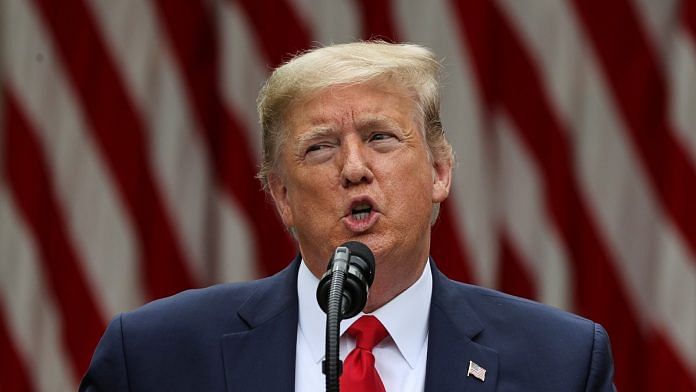New Delhi: Donald Trump has pleaded not guilty to 34 felony counts brought against him by a Manhattan grand jury. The former US president surrendered before a local court Tuesday in connection with allegations that he covered up the payment of ‘hush money’ to two women and a former Trump Tower doorman ahead of the 2016 presidential election.
The women, according to the indictment, were paid to maintain their silence over their alleged ‘extramarital affair’ with Trump, while the doorman was compensated to keep mum about his claim that the business-tycoon-turned-Republican politician had a child out of wedlock.
With the indictment, Trump (76) became the first former US president to face criminal charges and subsequent arrest. He was, however, released after his courthouse appearance, and returned to Florida where he delivered a speech at his private residence in Mar-a-Lago, slamming the charges and calling the judge overseeing the indictment a “Trump-hater”.
His speech came after New York County Supreme Court judge Juan Merchan warned the former president against making inflammatory comments. “Please refrain from making comments or engaging in conduct that has the potential to incite violence, create civil unrest, or jeopardise the safety or well-being of any individuals,” he reportedly told Trump’s lawyers.
While Trump has been charged, with his next court hearing on 4 December, a trial could be more than a year away. Despite being charged, Trump can continue his election campaign for the 2024 US presidential elections since the US Constitution does not restrict those charged, convicted of a crime, or even serving jail time, from running or winning the presidency.
However, since the felonies, in this case, are state-level charges, even if Trump were elected, he would not hold the power to pardon himself. The US Department of Justice’s refusal to prosecute a sitting president would also not be applicable to this case.
If Trump were to win the elections next year alongside being convicted on state charges and sent to jail, this hypothetical circumstance could end with his impeachment via the 25th Amendment of the US Constitution, which allows for the removal of a president who is unable to perform his duties.
Grand jury indictment & charges against Trump
According to a brief accompanying the indictment, Trump has been charged with 34 felony counts of falsifying business records, as part of a purported conspiracy to “conceal criminal conduct that hid damaging information from the voting public during the 2016 presidential election”.
The charges stem from three separate instances where Trump and his associates allegedly paid ‘hush money’ in the run-up to the 2016 election.
In the first two cases, ‘hush money’ was allegedly paid to adult entertainer Stephanie Clifford (Stormy Daniels) and Playboy model Karen McDougal through Trump’s then-lawyer Michael Cohen to cover up their separate sexual encounters with Trump in 2006 and the mid-2000s, respectively. Prosecutors said Clifford was paid $130,000 and McDougal $150,000.
Manhattan District Attorney Alvin Bragg claims Cohen wired the amount to Clifford’s lawyer using a shell corporation just 12 days before the election.
The third case pertains to a former Trump Tower doorman who, according to the indictment, was allegedly paid $30,000 in ‘hush money’ after he claimed to have information about a child Trump had out of wedlock.
If found to have “intent to defraud” including to “commit another crime or to aid or conceal”, Trump will be declared guilty under Article 175 of the New York Penal Law. Each of the 34 felony counts carries a maximum punishment of four years in prison but a judge, in this case, Judge Merchan, can sentence Trump to probation or suspend the sentence if convicted.
Of the 34 charges brought against the former president, 11 counts are related to fake invoices submitted by Cohen, another 11 are related to cheques written by Trump, and the remaining 12 are related to accounting records made for reimbursements in Trump’s books of accounts.
Bragg, who led the grand jury investigation, noted in a press conference that the alleged attempt to cover up the payments violated New York election law which criminalises illegal methods used to promote a candidate. Referring to the payment allegedly made to Cliffords, he said the $130,000 payment exceeded the limit for a federal campaign contribution.
Unlike a trial jury, a grand jury does not deliver a verdict but decides whether there is evidence to believe a crime has been committed. A grand jury comprises 16-23 American citizens. According to the New York court system, at least 16 grand jurors must be present for the presentation of evidence and the deliberation that follows, while at least 12 must vote.
Trump was invited to testify last month after prosecutors presented their evidence against him before the grand jury. However, his former lawyer Michael Cohen testified instead. “This is all about accountability. He needs to be held accountable for his dirty deeds,” Cohen had said of Trump outside a Manhattan courthouse ahead of his testimony.
On Wednesday, Trump arrived in New York and surrendered to law enforcement personnel who escorted him to the Manhattan criminal courthouse where he was scheduled for arraignment.
An arraignment is a legal process where a defendant is brought to court to be formally informed of charges brought against them. Here, the defendant is given the chance to plead guilty or not guilty in front of the judge.
The Indian judicial system follows a similar practice vis-à-vis Section 228(2) of The Code Of Criminal Procedure (CrPC) wherein once a judge frames the charges brought against an accused, the charges are read and explained to the accused who can then plead guilty or claim a trial.
(Edited by Amrtansh Arora)



